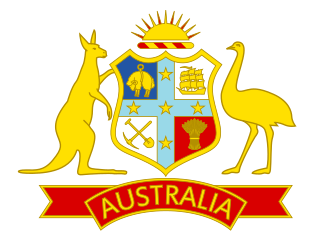
Mark Anthony Taylor is a former Australian cricketer and current Nine Network commentator. He was the captain of the Australian squad which finished as runners-up at the 1996 Cricket World Cup.

Sir Donald George Bradman, nicknamed "The Don", was an Australian international cricketer, widely acknowledged as the greatest batsman of all time. His cricketing successes have been claimed by Shane Warne, among others, to make Bradman the "greatest sportsperson" in history. Bradman's career Test batting average of 99.94 is considered by some to be the greatest achievement by any sportsman in any major sport.

The Australia men's national cricket team represents Australia in men's international cricket. As the joint oldest team in Test cricket history, playing in the first ever Test match in 1877, the team also plays One-Day International (ODI) and Twenty20 International (T20I) cricket, participating in both the first ODI, against England in the 1970–71 season and the first T20I, against New Zealand in the 2004–05 season, winning both games. The team draws its players from teams playing in the Australian domestic competitions – the Sheffield Shield, the Australian domestic limited-overs cricket tournament and the Big Bash League. Australia are the current ICC World Test Championship and ICC Cricket World Cup champions. They are regarded as most successful cricket teams in the history of Cricket.

Walter Reginald Hammond was an English first-class cricketer who played for Gloucestershire in a career that lasted from 1920 to 1951. Beginning as a professional, he later became an amateur and was appointed captain of England. Primarily a middle-order batsman, Wisden Cricketers' Almanack described him in his obituary as one of the four best batsmen in the history of cricket. He was considered to be the best English batsman of the 1930s by commentators and those with whom he played; they also said that he was one of the best slip fielders ever. Hammond was an effective fast-medium pace bowler and contemporaries believed that if he had been less reluctant to bowl, he could have achieved even more with the ball than he did.

Justin Lee Langer is an Australian cricket coach and former cricketer. He is the former coach of the Australia men's national team, having been appointed to the role in May 2018 and leaving in February 2022 and became the coach of Lucknow based IPL franchise Lucknow Super Giants in July, 2023. A left-handed batsman, Langer is best known for his partnership with Matthew Hayden as Australia's test opening batsmen during the early and mid-2000s, considered one of the most successful ever. Representing Western Australia domestically, Langer played English county cricket for Middlesex and also Somerset. He holds the record for the most runs scored at first-class level by an Australian. As Australia's coach, he led the team to victory in the 2021 T20 World Cup.

Damien Richard Martyn is an Australian cricket commentator and former cricketer, who played Tests and ODIs. He played for the national team sporadically in 1992–1994 before becoming a regular ODI player from 1999 to 2000 and a regular Test player in 2000 until his retirement in late 2006. He was primarily a right-handed middle-order batsman with a 'classical' technique, known in particular for his elegant strokemaking square of the wicket on the off-side and through the covers. Martyn was a member of the Australian team that won two consecutive world titles in a row: the 1999 Cricket World Cup, the 2003 Cricket World Cup, as well as being a member of the team that won the 2006 ICC Champions Trophy.

Shane Robert Watson is an Australian cricket coach, commentator and former cricketer who played for and occasionally captained the Australian national cricket team between 2002 and 2016. He was an all-rounder who played as a right-handed batsman and a right-arm fast-medium bowler. He was ranked as the world's No. 1 all-rounder in Twenty20 Internationals (T20I) for 150 weeks, including an all-time record of 120 consecutive weeks from 13 October 2011 to 30 January 2014. He began playing during the Australian team's golden era in the early 2000s, and was the last player from this era to retire. In his time playing for Australia, Watson was part of their winning squad in the Cricket World Cup two times in 2007, and 2015 along with the ICC Champions Trophy twice in 2006 and 2009, with Watson named as the player of the match in the final on both occasions, as he scored the winning run in the 2006 tournament, with the winning six in the 2009 tournament.

Steven Peter Devereux Smith is an Australian international cricketer and former captain of the Australian national team in all three formats of the game. He is widely regarded as one of the greatest Test batsmen since Don Bradman. Smith was a member of the Australian teams that won the 2015 and 2023 Cricket World Cup, the 2021 ICC T20 World Cup, and the 2023 ICC World Test Championship final.

Headingley Cricket Ground is a cricket ground in the Headingley Stadium complex in Headingley, Leeds, England. It adjoins the Headingley Rugby Stadium through a shared main stand, although the main entrance to the cricket ground is at the opposite Kirkstall Lane end. It has hosted Test cricket since 1899 and has a capacity of 18,350.










